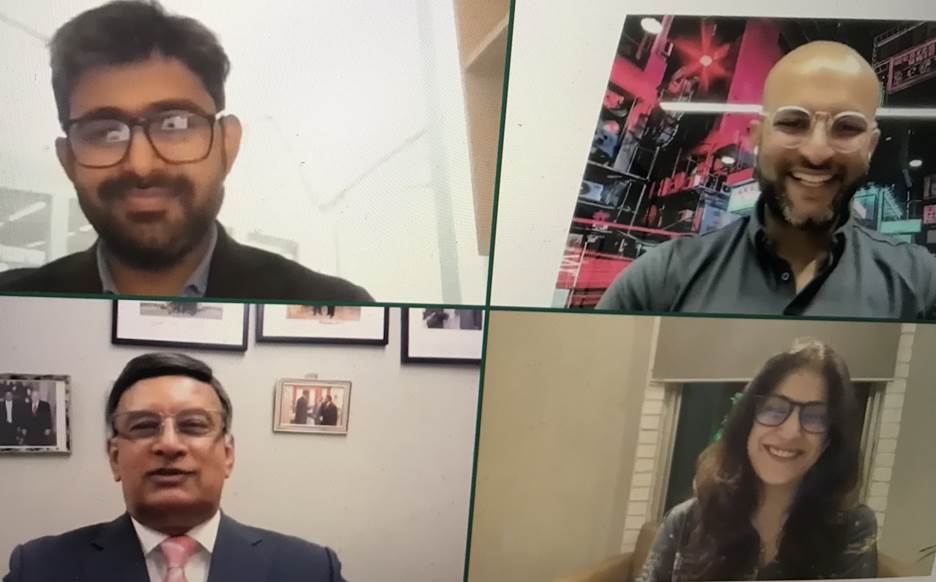
Top (left) Asfandyar Mir; (right) Uzair Younus. Bottom (left) Husain Haqqani; (right) Amber Rahim Shamsi
Hudson Institute Spotlights Pakistan’s Persistent Crises
By Elaine Pasquini

Washington: Husain Haqqani, the Hudson Institute’s director for South and Central Asia and former Pakistani ambassador to the United States, hosted an online panel on October 10, 2023, to discuss “Pakistan in Crisis.”
While Pakistan has often been a country in crisis, over the last few months it’s been mired in political, social, security and economic ones, Haqqani said. Inflation remains at an all-time high and economic growth has slowed down with contraction in both agricultural output and the industrial sector. In addition, a very young population has a very large percentage of unemployment, he added.
Long-delayed and highly anticipated general elections are scheduled to be held February 8, 2024. Since the expiration of the last prime minister’s term, “the omnipotent Pakistani establishment has regained its supremacy with a vengeance and appears to be more in control today than it has been in recent years,” Haqqani opined.
According to Amber Rahim Shamsi, director of the Center for Excellence in Journalism at the Institute of Business Administration in Karachi, inflation, which possibly is at a historic high, is presently the biggest economic crisis.
With the rise in the cost of living, Pakistanis are finding it difficult to pay for education and are moving their children into low-cost private schools or public schools. Electricity bills are rising and frequently consume half of their income, forcing many to borrow money, she said.
People feel that the last government [the Pakistan Democratic Movement, a coalition of several political parties] and the previous Prime Minister Shehbaz Sharif of the Pakistan Muslim League are responsible for the more difficult economic challenges that they are facing, Shamsi related.
One silver lining in this situation, however, is Pakistan’s “independent Chief Justice heading the Supreme Court at the moment who has spoken very openly against military interference and has a good idea of how to reform the Supreme Court,” she stressed.
Another positive development has been that “civil society in Pakistan, as broken as it has been, and journalists in Pakistan…continue to push back against the loss of their rights and human rights as well,” she added.
Continuing on the silver lining topic of Pakistan’s current crises unlike ones in the past, Asfandyar Mir, a senior expert in the South Asia program at the United States Institute of Peace, said presently he believes that the Pakistani leadership and the Pakistani elites feel the real sense of crisis. “I think there is a growing recognition, in particular because of how these crises have played out over the last year, that there is no help coming and ultimately the Pakistanis have to solve their own problems,” he said. “This gives me some hope…that this sense of crisis will lead to some re-evaluation of some of Pakistan’s foreign policy choices in particular with respect to India and on the question of the US-China balance. I hope Pakistani leaders recognize that there is a cost to military alignment and other forms of alliances, which they should be very careful about and calibrate the balance between the United States and China accordingly.”
The big issue in this era of intensifying strategic competition is Pakistan’s alignment with its important neighbor, Mir continued. “Western capitals are watching Pakistan’s relationship with China very closely especially given the economic troubles that Pakistan has had due to which China’s influence on Pakistan has mounted considerably and we see signs of closer alignment.”
Uzair Younus, director of the Pakistan Initiative at the Atlantic Council’s South Asia Center, noted that not only has Pakistan’s current economic crisis impacted the lower rungs of society where one in four children is malnourished and almost half of young women are illiterate in Pakistan, “but now it is bleeding into the middle and upper middle class – the aspirational classes of Pakistan,” he said. “Their purchasing power has been fundamentally destroyed and it will take years to recover from that crisis.”
Data shows that for the past 23 years Pakistan’s economy has been lagging compared to countries in the region. But what is different this time around, Younus said, is that “over the last three or four years, Pakistan has had an immensely divergent experience on the inflation front. Data shows that over the last three years the inflation rate in Pakistan cumulatively has been over 100 percent, about three times that of India and Bangladesh.”
In Younus’ opinion, there were a series of errors over the last few years that compounded the problems facing the economy which sent the International Monetary Fund program off track and former Prime Minister Shehbaz Sharif’s subsequent intervention led to a new agreement with the IMF. One enormous problem, he highlighted, is the fiscal deficit side issue and the fact that Pakistan’s wealthy continue to refuse to pay their fair share of taxes even amidst the historic crisis in the country. “So long as that remains the case, elections or no elections…if the decision matrix does not change, this crisis will continue to worsen,” he warned.
“The fact of the matter is that the economic challenges Pakistan faces are not that complicated,” Younus stated. “They are not rocket science problems that need to be resolved through some creative mix of economic engineering. It requires basic prudent macroeconomic policies with a credible roadmap that is executed and led by credible people at the top who convince not only domestic constituents but more importantly international creditors that there is a plan and we’re going to stick to the plan.”
“My view,” he added, “always has been even if you have elections, a new government without the roadmap…will only exacerbate this crisis moving forward.”
(Elaine Pasquini is a freelance journalist. Her reports appear in the Washington Report on Middle East Affairs and Nuze.Ink.)

